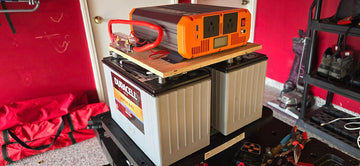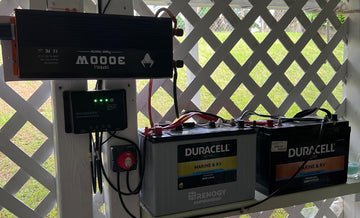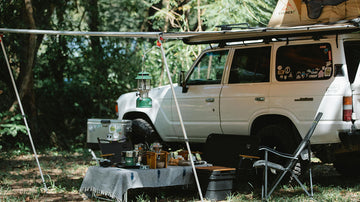Solar panels are extremely durable and can provide clean, renewable solar energy for 25 years. However, if dirt and dust accumulate on the panels' surface, it will block sunlight, which can reduce energy generation. It's important to understand how to clean and maintain solar panels to make the most of solar energy and ensure its efficiency.
Regular inspections can help you identify problems in good time. If a problem does occur, your equipment warranty should cover the cost of replacement and repair!
The importance of maintaining solar panels
Regular maintenance of solar panels can increase the amount of electricity generated by approximately 15%, which is important for the system's overall performance and profitability.
Factors that can affect the life of a solar panel:
Temperature
Extreme high or low temperatures can affect the performance and life of solar panels.
The efficiency of solar panels exposed to high temperatures may decrease over time. Elevated temperatures cause thermal stress on materials, so PV cells may degrade more quickly.
Prolonged high temperatures cause thermal stress on the materials and components of solar panels, resulting in the expansion and contraction of the materials, so PV cells may experience a faster degradation process.
Shading
If solar panels are partially shaded by trees, buildings, or other objects, the performance of the entire system can be affected. Partial shading can cause reverse currents that can damage the panels or the inverter. Prolonged shading problems can cause internal damage to the system, which can reduce the safety and stability of the system.
Dust and dirt accumulation
Accumulated dust and dirt can reduce light transmission and affect the efficiency of the panels in generating electricity. If not cleaned regularly, dirt can stick to the surface and cause permanent damage.

Steps to maintain solar panels
Solar systems are relatively inexpensive to maintain because they have no moving parts subject to mechanical wear and tear. In most cases, it's just a matter of keeping the panels free of debris. If your panels are tilted, you're in luck: rain washes away the dirt that collects on them.
Here are a few things you should do regularly to keep your solar panels in tip-top shape:
- Visual inspection
- Servicing your panel
- Cleaning solar panels
- Remove potential hazards
- Avoid shading:
- Check the inverter
- Check cables and plugs
- Check the racking structure
- Daily performance check of the solar panels
Visual inspection
Perform a visual inspection of the solar panel and check for dirt accumulation or damage to the solar panel, such as cracks, breaks, or loose connections. If any problems are found, contact a professional for the necessary inspection and repair.
Servicing your panel
We recommend that you have your system checked by a professional at least once every 5 years. This way you'll be prepared for any unpleasant financial surprises while ensuring that your solar panels are producing enough energy to save you money on your electricity bill.
Cleaning solar panels
To keep your solar panels in good condition, you will need to clean them at least twice a year: once in late autumn and once in early winter. Ensure that your solar panels are working efficiently during the winter months when sunlight levels are low. If the installation is in an area with a high concentration of dust, pollen, or dirt, more frequent cleaning is recommended, for example, every three months.
Remove potential hazards
Ensure that the area around your solar panels is clean, clearing away any overhanging branches to prevent the accumulation of fallen leaves or other debris that could affect the performance of your panels. You should also keep pests such as squirrels and pigeons away from your solar panels.
Avoid shading:
If solar panels do not have access to sunlight, their energy production will be greatly reduced. Check your surroundings regularly to ensure that there are no trees, buildings, or other objects that could cast shadows over the solar panels. Trim nearby trees and do not allow ivy to grow near the solar panel.
Check the inverter
Regularly check the operating status of the inverter to ensure that it is working properly and that there are no unusual noises or alarms. If the indicator light on the inverter is flashing green, this means that the solar system is not malfunctioning. If the light is not flashing, this may indicate a potential problem that could end up costing you a lot of money if left unaddressed.
Check cables and plugs
At least once a year, inspect electrical wiring, fittings, earth conductors, and any other visible electrical hardware for safety and damage. Check PV wires/cables to ensure they are not touching the roof or otherwise unsafe and are securely connected. All PV wires should be securely fastened to the rack or panel frame using wire clamps.
Check the racking structure
Please check the stability of the racking at least once a year to ensure that the solar panels are mounted on a stable support structure with no signs of debris build-up or loose hardware.
It's important to consider the type of structure, weather, cost, and other factors when choosing solar racking, read this guide to solar racking.
Daily performance check of the solar panels
Monitor the performance of your solar system regularly. Many of the solar inverters used in PV systems have mobile apps that allow you to track daily productivity. If your solar system's output drops more than normal, you'll know it needs attention. Solar systems that are damaged, dirty, or otherwise malfunctioning will not perform well.
Output may be low on cloudy days, but if you notice low productivity on a sunny day and the solar panels are not shaded. Then there may be a faulty solar panel or other system component.
High-quality solar panels tend to lose efficiency more slowly, on average only 0.5% per year. This means that even after 20 years of use, more than 90% of the initial energy output will still be available. Choosing high-quality solar panels can help ensure a long-term return on investment.
How to clean solar panels?
Water
Distilled water and deionized water are two forms of pure water, free of impurities and minerals. They are ideal for cleaning solar panels as they will not leave mineral stains or deposits on the surface.
Cleaning agents
To avoid damage to the solar panels, choose mild detergents that are compatible with the materials used in the solar panels, such as glass and protective coatings. Specialist cleaners for solar panels can also be used. Avoid harsh chemicals such as abrasive cleaners or solvents that can corrode materials, scratch PV cells, or leave a residue.
Brushes, sponges, and cleaning tools
Soft-bristled brushes can be used to remove dirt from solar panels. Try not to press too hard to avoid scratching or damaging the surface. If you choose to use a sponge or cloth, it is best to choose a microfibre material as it will effectively remove dirt and debris without damaging the surface of the solar panel
Telescopic handle
Solar panels are usually located on the roof, so using a telescopic pole or handle makes it easier to reach higher and more difficult areas. Safety is the key to preventing accidents. If you are unable to clean your solar panels yourself, it is recommended that you hire a professional service.
In the previous article, we provided detailed steps and precautions for cleaning solar panels.
FAQs
Q: Do solar panels require high maintenance?
A: Solar panels are very durable and have a lifespan of over 25 years. During this time, little maintenance is required, usually just keeping the panels clean and out of the sun. However, it is necessary to monitor the production of the system to ensure that its performance and output are at their optimum.
Q: Do solar panels need to be cleaned?
A: Accumulated dust and dirt can shade the solar panels and reduce their performance. In areas with sufficient rainfall, rain is sufficient to clean solar panels. However, in dry climates, solar panels will need to be cleaned more frequently using an electric cleaner.
Q: Is it OK to clean solar panels with water?
A: The best way to clean solar panels yourself is with water. Soft or distilled water is best to avoid leaving scale or mineral residue on the surface of the solar panel. Avoid using water that is too hot, too cold, or under high pressure to clean your solar panels as this can cause permanent damage to your solar panels!
Q: Can you monitor the health of your solar panels?
A: If the energy output of your solar panel starts to drop, you can monitor it through the app. Lower energy output can indicate that your solar panel is blocked by objects such as debris and is not producing its normal amount of power.

















